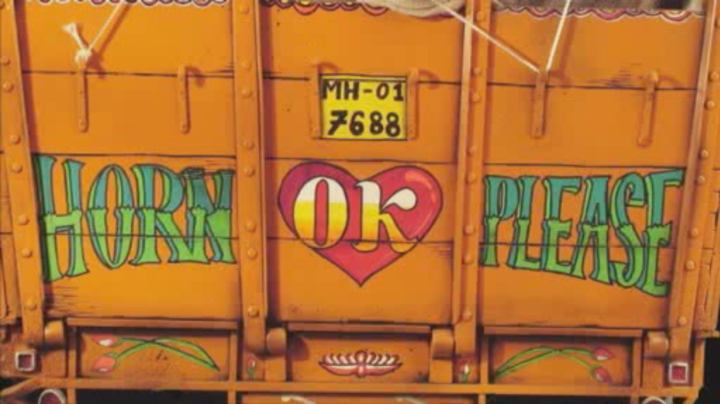Anyone who has ever spent any amount of time on an Indian road is likely to recognize the title of this post.

Horn Okay Please (HOP) may very well be the mascot for Indian-English, the delightfully maddening idiosyncratic use of English by Indians.
The wikipedia entry I link to above is long but interesting... and a must-read for anyone who wants to get the most of their next trip to India. Also, those who want to hardcore into the "fundas" of this language, please check out this thorough online Indian-American dictionary.
(Hinglish - a sort of mash up of Hindi and English - is a related, but distinct language.)
So what does Horn Okay Please mean, actually? Nobody quite knows, although theories abound. Driving in India means using your horn to communicate, well, everything -- so it seems like good advice however you take it. More importantly, HOP is one of those phrases that has just become part of the mysterious Indian (and Indian-American) lexicon. Its become a way of sharing common experience -- a sort of sutra that encapsulates a whole in-house experience in a simple (albeit meaningless) phrase.
In ISKCON, we have our own language. ISKCON-ese is a tossed salad of Sanskrit (suchi, laksmi), Bengali (doya koro) Hindi (pukka, accha), Hippie English (spaced out, far out, fried), British English (pass water, obeisances) and assorted Prabhupada-isms (first class, take rest, fruitive).
It would be interesting (and historically useful) to compile a running list. Is PAMHO the ISKCON equivalent of Horn Okay Please?
 Jargon is useful, of course, and -- like Horn Okay Please -- can bond people together. But it can also alienate others by erecting walls between insiders and outsiders. ISKCON's history (and language) is certainly intimately linked with India, counterculture America, and (through SrilaPrabhupada) colonial Britain. But if we don't make an effort to communicate the essence of Krishna consciousness and Prabhupada's mission in language that is inclusive and meaningful to a broader audience, we may be rendering ourselves as unintelligible as the messages on the back of an Indian truck.
Jargon is useful, of course, and -- like Horn Okay Please -- can bond people together. But it can also alienate others by erecting walls between insiders and outsiders. ISKCON's history (and language) is certainly intimately linked with India, counterculture America, and (through SrilaPrabhupada) colonial Britain. But if we don't make an effort to communicate the essence of Krishna consciousness and Prabhupada's mission in language that is inclusive and meaningful to a broader audience, we may be rendering ourselves as unintelligible as the messages on the back of an Indian truck.And as Radha Devi Dasi says in her ISKCON Studies article, jargon can be misused to more serious ends, as well:
...we have our own jargon that both isolates us and condemns those who are not members of our organisation. Those outside our movement are called 'karmis', 'demons', 'melecchas' and 'sudras'. We describe ourselves as 'devotees', 'Vaisnavas', 'devas' and 'brahmanas'. These labels shape our vision of others and ourselves in ways that divide us from the very people we are trying to reach.Horn Okay Please can evoke nostalgia, togetherness, and good laughs -- as long as everyone is in on the joke.
- Vyenkata Bhatta Dasa
PS: Can't get enough of HOP? Okay, okay... one more link. Check out "Horn Okay Please" -- an excellent clay-mation short film on a day in the life of a Mumbai taxi-wallah.
No comments:
Post a Comment